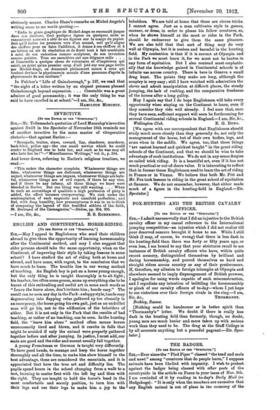ENGLISH AND CONTINENTAL HORSE-RIDING.
[TO THE EDITOR OP THZ "EPRCTATOR.'1
SIR,—May I appeal to Englishmen who send their children abroad to give them the opportunity of learning horsemanship after the Continental method, and may I also suggest that older persons should take the same opportunity, when on the Continent, of improving their style by taking lessons in some school ? I have studied the art of riding both at home and abroad, and have come, with regret, to the conclusion that we have much to learn. The trouble lies in our wrong method of teaching. An English boy is put on a horse young enough, but the only thing he is taught thoroughly is to sit tight ; his teacher, too often some groom, sums up everything else to be learnt of this enthralling and useful art in some such words as " Leave the horse alone, don't irritate him ; hands easy." The result can be seen any day in the Park: a sloppy style, hands easy degenerating into flapping reins gathered up too clumsily in an emergency, the horse going his own gait, just as an undrilled man will go his, not to the edification of the beholders of either. But it is not only in the Park that the results of bad teaching, or rather of no teaching, can be seen. In the hunting field, the "leave him alone" method often means horses unnecessarily tired and blown, and it results in falls that might be avoided if only the animal were properly gathered together before and after jumping. In justice, I must add, our seats are good and the rider and mount usually fall together.
A young Frenchman or German is taught very differently. To have good hands, to manage and keep the horse together thoroughly and all the time, to make him show himself to the best advantage, these are considered the essentials, and it is appreciated that here the true art and difficulty lies. The pupils spend hours in the school changing from a walk to a trot, learning to canter first with the left leg and then with the right. They are taught to hold the horse's head in the most comfortable and seemly position, to turn him with their legs and use their legs to make him a joy to the
beholders. We are told at home that these are circus tricks. I cannot agree. Just as a man cultivates style in games, manner, or dress, in order to please his fellow creatures, so, when he shows himself at the meet or rides in the Park, should he endeavour to give them the same pleasure. We are also told that that sort of thing may do very well at Olympia, but it is useless and harmful in the hunting field. My contention is that if it is correct at Olympia and in the Park we must learn it, for we must not be beaten in any form of equitation. But I also contend most emphatic- ally that the knowledge gained in Continental schools is of infinite use across country. There is here in Geneva a small drag hunt. The points they make are long, although the couptry is very easy ; still I have watched with admiration the clever and adroit manipulation at difficult places, the steady jumping, the lack of rushing, and the comparative freshness of the horses after a long gallop.
May I again say that I do hope Englishmen will take every opportunity when staying on the Continent to learn, even if they consider they ride well already. I feel sure that, once they have seen, sufficient support will soon be forthcoming for several Continental riding schools in England.—I am, Sir, &c., [We agree with our correspondent that Englishmen should study much more closely than they generally do, not only the management of the horse, but of their own bodies, legs, and arms when in the saddle. We agree, too, that these things "are easiest learned and quickest taught" in the great riding schools of the Continent, and that we should be wise to take advantage of such institutions. We do not in any sense despise so-called trick riding. It is a beautiful art, even if it has not much practical or out-of-doors value. It is interesting to reflect that in former times Englishmen used to learn the art of riding in France or in Vienna. We believe that both Mr. Pitt and. Mr. Fox took lessons in riding in the great school of equitation at Saumur. We do not remember, however, that either made much of a figure in the hunting-field in England.—En. Spectator.]


















































 Previous page
Previous page